Submission Deadline
28 February 2026
Judging
Date
24 & 25 March 2026
Winners Announcement
22 April 2026
28 February 2026
24 & 25 March 2026
22 April 2026
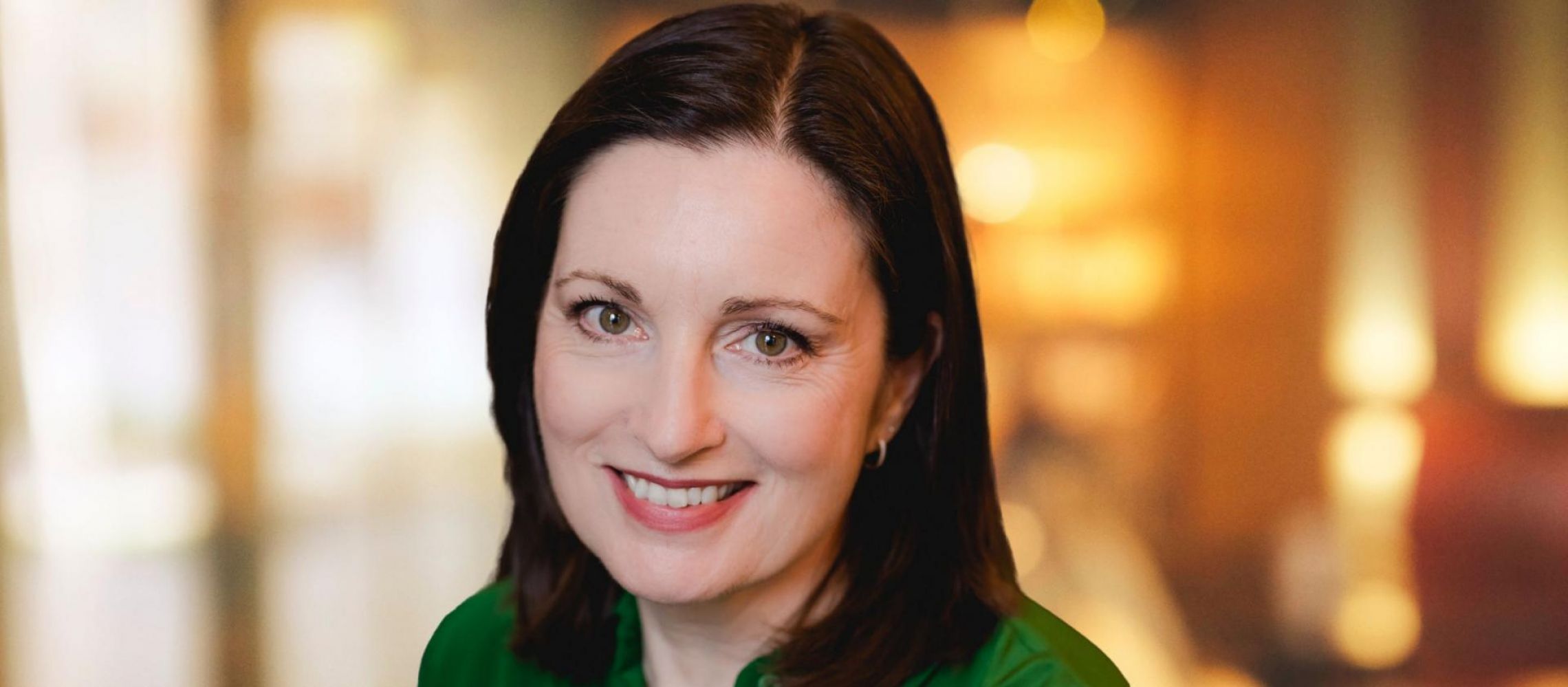
Michelle Brampton’s career trajectory is nothing short of inspiring. After nearly two decades at Treasury Wine Estates (TWE), where she climbed the ranks to Managing Director, EMEA, Michelle made a significant career shift to become the CEO of the Wine & Spirit Education Trust (WSET). This transition not only marked a change in the sector—from the commercial drinks industry to a not-for-profit education organization—but also brought about a new leadership style and a fresh strategic vision for WSET. In this interview, Michelle shares the biggest changes she has experienced, her strategic imperatives for WSET, and her passion for promoting diversity, inclusion, and sustainability within the global drinks industry.
One of the biggest changes moving from the commercial drinks sector to a not-for-profit education organisation (WSET), was the difference in culture and speed of operating - driven by the very different nature of our products and the needs of our customers, namely our course providers and students.
Also, when I joined WSET just over two years ago, my role changed. The role of CEO is unique in an organisation and as the one who manages relationships between the leadership team and the Board of Trustees, you don’t have a natural peer group.
I’ve made changes to WSET’s leadership team, bringing in new skills and also empowering our existing, very talented people. We now have a strong leadership team and the right people in place to deliver our strategy. Over time we’ve also introduced positive changes to our organisational culture, which now feels more values-based, inclusive, and collaborative. Both of these changes have made a big difference to me personally and made me feel more connected to everyone in the organisation.
Our six strategic imperatives are People and Culture, Customer Service, Product, Brand, Environmental, Social and Governance (ESG), and Route to Student.
Our strategic imperatives are shaping the future of our organisation by guiding us to: create an inclusive and purposeful culture where our people feel valued, improve our systems and processes to offer excellent customer service, and develop our portfolio of learning experiences through a student-centred approach. They will also enable us to evolve WSET’s brand, ensuring it remains credible and relevant, establish a meaningful ESG agenda (both internally and externally), and build a sustainable multi-channel strategy for our products.
For example, we’ve made positive changes to our organisational culture, by establishing feedback groups, listening to employees, and establishing networks and working groups to drive actions based on employee input. Overarching this is the intent to create a more inclusive culture and ensure that our people are clearer about our plans and vision. I’ve seen this in action as our teams work together with a greater shared sense of purpose in developing and improving our products and services.
Improving our customer service is crucial and we’ve taken steps to modernise systems and processes as well as our qualifications, including making them more accessible both in content and format. For example, for the Level 3 Award in Spirits, students receive a preparation course online before they start the course. They still get a course textbook but providing them with an online component is part of the hybrid approach to learning we are looking to develop, in order to support different learning styles.
WSET’s Partnership Programme enables us to use our global reach and influence to work towards creating a more diverse and inclusive global drinks industry. We have 48 companies in the programme who support us globally on a variety of social impact projects with a diversity and inclusion agenda. This is largely delivered through partnerships or bursary provision.
For example, we’re currently partnering with the Women in Beer Mentorship Programme. It aims to give women starting their careers in beer the chance to link up with more experienced women working in the industry, to help expand their career opportunities. WSET is an education partner for this programme and is sponsoring mentees for its second pilot which runs until this October.
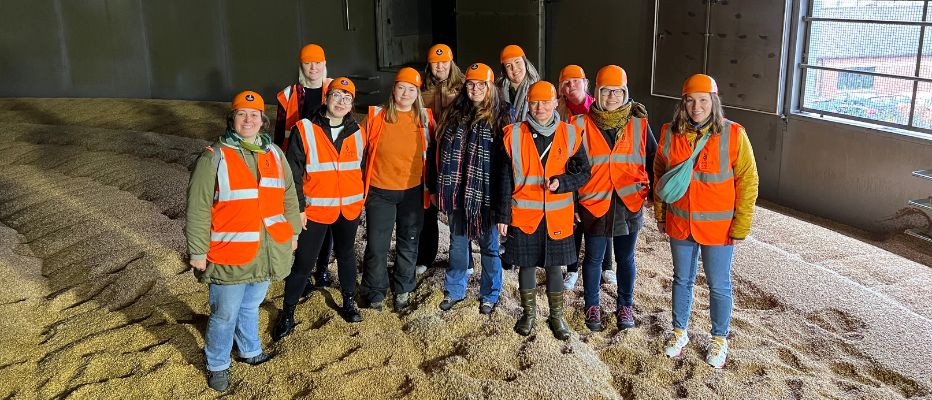
Image: The Women in Beer Mentorship programme
We’re also working with other organisations such as US non-profit The Roots Fund and The Black Cellar Club in South Africa to make drinks education more accessible. For example, The Roots Fund initiative offers a scholarship programme that aims to support education and career opportunities in the spirits industry for people from ethnic minority groups.
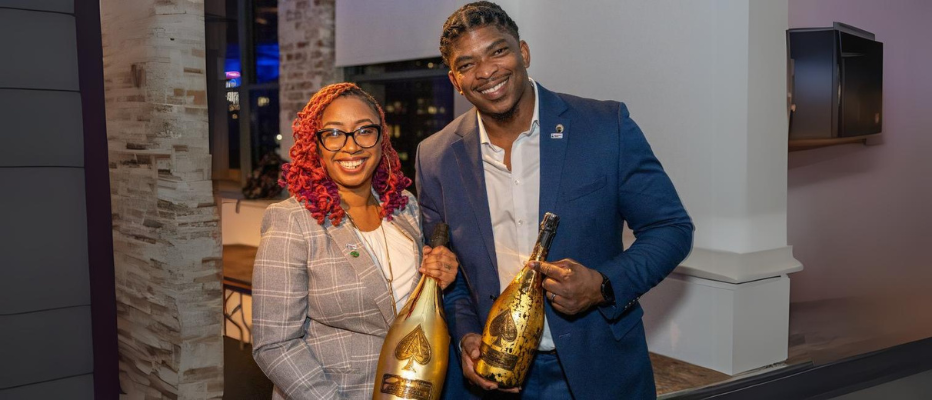
Image: Roots Fund scholarship programme (also mentioned in the copy below) Roots Fund scholars during wine service at the annual auction event. Photo by K Huey Media/The Roots Fund.
I’m particularly proud of a new EDI initiative set up by WSET, The Drinks Trust, and the WSTA (Wine & Spirit Trade Association). We’re currently collaborating on an industry-wide programme called Drinks United which was set up in response to issues identified around safeguarding and equity for those working in the industry. The programme’s ultimate aim is to create an ‘inclusive and equitable UK drinks industry, where everyone feels welcome, safe and supported’.
I’m also very proud of our Partnership Programme and what it has achieved to date to help create a more inclusive global drinks industry through its social impact projects. There is still so much more to do but the programme has really helped move the dial on ED&I initiatives and encourage more organisations in the drinks industry to accelerate progress on these. Please get in touch if you would like to be a partner!
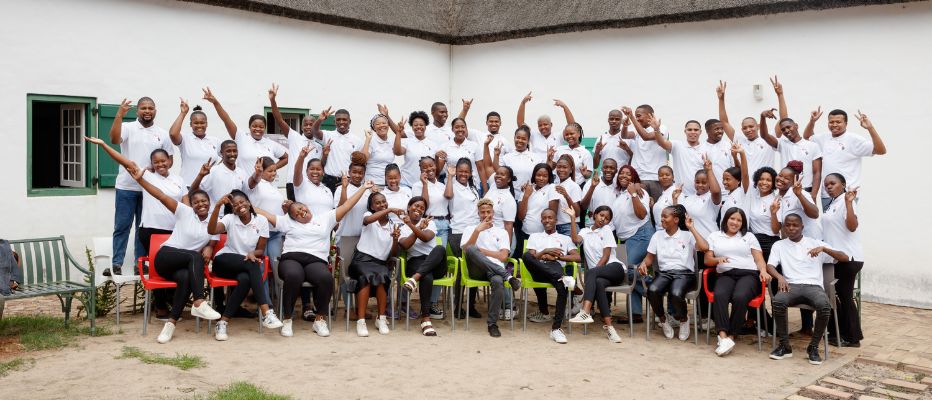
Image: Pinotage Youth Development Academy (PYDA)- based in Stellenbosch, South Africa. (Some further information: PYDA offers a programme to help young people from under-resourced areas gain employment and meaningful economic opportunities within the wine industry. WSET’s Level 2 Award in Wines has been an integral part of PYDA’s curriculum for nearly 10 years and is jointly funded by the International Wine Challenge (IWC) and WSET. The programme forms part of WSET’s social impact work which aims to make drinks education accessible and affordable for all.)
Sustainability is high on our agenda - ESG is one of our six strategic imperatives and is embedded in our plans which are across three areas – our products, the drinks industry, and our organisation.
Our products are reviewed and updated to incorporate sustainable practices and considerations. Including these in our courses means we can reach more students.
We use our global reach and platforms like our industry talks to connect people who are experts in the field to share best practices on sustainability more widely.
We’re working to reduce WSET’s carbon footprint. We’ve expanded and developed materials for our courses, including e-books, the Online Classroom, and remote invigilation for our exams. These measures provide options for our course providers to use less paper-based course materials and in turn, they will also reduce courier deliveries for these. We will soon be implementing digital certificates and there is further new technology to come next year.
In addition, the majority of our events for our course providers are virtual, thereby eliminating the need for our global stakeholders to travel to these.
There are significant shifts in how and what people are drinking, with many people drinking less often, preferring lighter styles of drinks such as low-alcohol or no-alcohol wines, or indeed abstaining from alcohol completely.
There are also challenges affecting the global economy, namely high inflation and the ongoing cost of living crisis. This affects the drinks industry at all levels, from the production and supply chain to consumer demand.
Sustainability is a major challenge for the drinks industry, how it adapts to climate change which affects so many aspects of its work, from agricultural production to packaging and logistics.
As a neutral, non-commercial, well-connected ‘hub’ organisation, WSET is in a strong position to connect the drinks industry to raise awareness and support tackling these challenges by sharing best practices much wider.
A key moment for me was when I left a career in management consultancy, which I was not enjoying, to join the drinks industry in my late twenties.
I was looking for something completely different and came across a job advert ‘wine company seeks finance analyst’ at SouthCorp Wines, which later became Treasury Wine Estates (TWE). As someone interested in wine, I wanted to work in an industry I thought I would enjoy. I joined on a six-month contract and ended up staying there for 19 years.
TWE had a supportive and empowering culture and I was lucky to have the backing of several sponsors at the company, both female and male. They encouraged me to take my first senior position as finance director and to keep progressing to Managing Director, EMEA. I found that level of support hugely beneficial and it shaped my whole approach to leadership and mentorship.
I know from that experience how important it is to have someone who can see your strengths and who can support and empower you when making key decisions. That’s why I’m passionate about mentoring others, which is something I do now. Sometimes people just can't see their talents and attributes and they need some encouragement to achieve their potential.
Becoming CEO of WSET was a key moment for me and the role came at just the right time. I’d worked in the commercial drinks sector for a long time and served on several drinks industry boards and wanted a role that would allow me to make a difference. I feel immensely privileged to be leading an organisation that has a positive impact on people’s lives, through our purpose to ‘empower people through inspiring learning experiences all over the world’.
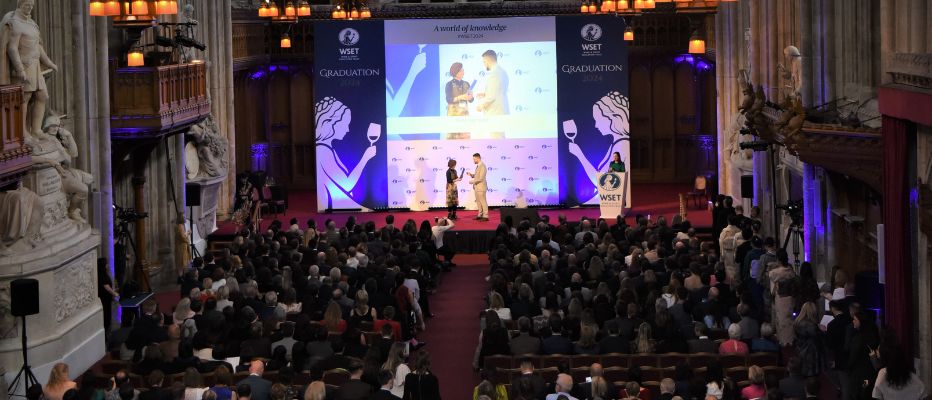
Image: WSET’s 2024 graduation ceremony for Diploma students – there was a record number of graduates this year.
I want WSET to be recognised, not only as the global leader in drinks education but also for our impact in creating a more sustainable and inclusive drinks industry.
We have an important role in enabling conversations for the drinks industry on a range of topics mentioned above. As a brand-neutral organisation with global reach and connections, we’re in a prime position to work with others to achieve this.
We’ll continue to focus on growing our qualifications to develop our multi-category global offering. Earlier this year we launched our new beer courses - our first new drinks category for a decade – and also our new Level 2 Award in Sake.
We’re also looking to improve the accessibility of our course materials and tailor these more to students’ different learning styles. Many of our courses are currently classroom-based, but we want more people to have access to different ways of learning including hybrid and online. We want to make it easier for students to learn in whichever way suits them, wherever they are in the world, and do everything we can to enhance their learning experience with WSET.
[[relatedPurchasesItems-63]]
Looking ahead, Michelle envisions WSET not only maintaining its position as the global leader in drinks education but also playing a pivotal role in fostering a more sustainable and inclusive industry. Under her leadership, WSET is poised to expand its qualifications, embrace diverse learning styles, and continue to drive impactful change through its strategic imperatives. Michelle’s journey and agenda in her role as CEO of the WSET show her visionary leadership, commitment to inclusivity, and dedication to creating a positive impact in the drinks industry. As WSET continues to evolve, Michelle’s influence will undoubtedly leave a lasting legacy, inspiring future leaders to champion the values of diversity, sustainability, and excellence.
Header Image: WSET CEO Michelle Brampton
In conversation with Malvika Patel, Editor and VP, Beverage Trade Network
Show your spirits where it matters. Get your products tasted by top bartenders, buyers and experts at the London Competitions — enter now.